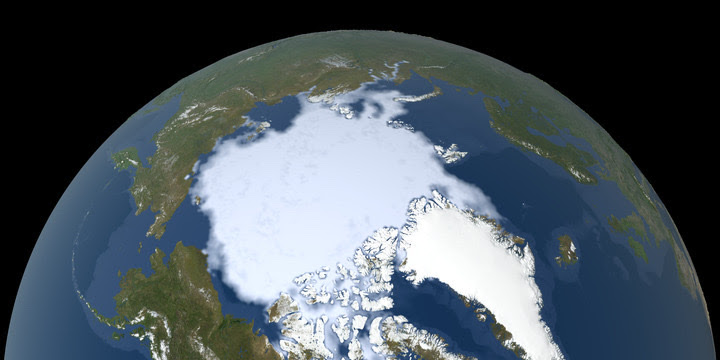On one of the most significant public policy issues of our time, the major split in our society is not between political parties – it is between the young and the old, regardless of political party affiliation.
The issue they disagree on influenced by their age is Climate Change.
Recent surveys show twice as many young adults aged 25 – 41 think America should phase out fossil fuels, compared to the around-60-year-old ‘Boomer’ generation.[1] Another example: right at 60% of the younger group are in favor of phasing out gas-powered vehicles, while 60% of the older group opposes that.[2]
I believe that one potential cause of this age-related belief system is the percentage of your life you have lived during which you have actually seen the evidence emerge.
Look at the two pictures below, taken by NASA satellites of the North Pole. The 1980 image shows twice as much Arctic ice as the 2020 version. If you are under 40, the North Pole has shrunk 50% during your life. The closer you are to 80, you may not be aware of the speed it is shrinking.
|
|
A good example: the weather records of Charlotte N.C. show that for the 10 years between 1980 and 1990 there were an annual average of 44 days over 90 degrees. For the decade between 2010 and 2020, the annual average was 62.[3]
If you are 40 years old today, when you were around 10, you were way more comfortable outside than your 10-year-old child will be today.
Climate Change is impacting younger Americans profoundly. [4] Fifty-nine percent of them report they are very worried about it. Psychologists say this is often mentioned by youth who report persistent feelings of sadness or hopelessness, the number of which has increased by 40% amongst high school students in the last decade. No wonder we are seeing a 57% increase in suicide rates among youth ages 10-24 in the U.S.
The key reason for this decline in mental health is that as a society we are discussing the issue as if it were a global problem, to be solved by an international treaty. This leaves youth who are trying to mature into responsible adults feeling powerless, and victimized.
To address both climate change and save our youth, we need to develop strategies that younger generations can implement locally, today.
We have to give them the power to fix the problem in their own home, school, and town, and restore both their sense of power and responsibility.
As a child, when I was confronted with a scary problem, my dad would say “time to put your big boy pants on”, and then he showed me what to do. He would hover, but not do the work for me.
Are you ready to help this appropriately scared and wounded younger generation do that?
Over the next few weeks, I will be sending out communications like this to educate you on powerful dimensions of the Climate Change threat you may not be aware of, as well as locally implementable solutions you can undertake to rescue us all. Please share them with those you turn to for advice on how to use your computer or cell phone, and listen to them.
Leaking cooling gasses from school kitchens and school air conditioning are 1,000 to 7,000 times more climate-changing than CO2. (5) At the top of our list is a program that teaches middle school and high school students to use meters we loan them to survey their school and their home for cooling gas leaks. When they do the investigation, report their results, and show the school leadership how much money could be saved, these leaks are usually repaired. This is good for the climate, our future, and the kids’ mental health.
Next time you are in the presence of a youngster, please ask them how they feel about climate change. If they are anxious, tell them to email us (address below).
They really need you badly to listen to them.
Authored by Francis Koster Ed. D

